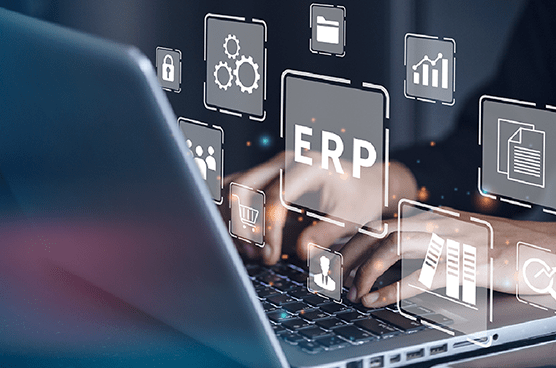_ _ Infobelt
The Benefits of Integrating Application Retirement with ERP Systems.
In the complex landscape of enterprise technology, retiring outdated applications is crucial for maintaining an efficient, secure, and cost-effective IT environment. Integrating this process with Enterprise Resource Planning (ERP) systems can streamline operations, enhance data integrity, and deliver substantial cost savings. This comprehensive guide explores the benefits of aligning application retirement with ERP systems, providing businesses with a strategic approach to managing their IT assets.
Understanding ERP Systems and Application Retirement
ERP systems are comprehensive software platforms that help organizations manage and integrate their crucial business parts. Depending on the business’s needs, an ERP software system can include modules for inventory management, accounting, order management, human resources, customer relations management, and more.
Application retirement, conversely, involves decommissioning outdated or redundant applications that no longer provide value to the organization. This process reduces the sprawl of IT applications and mitigates the risks associated with unsupported or inefficient software.
Integrating these two processes creates a cohesive strategy that enhances IT and business performance. Below, we delve into the specific benefits of this integration.
Streamlined Management and Oversight
Integrating application retirement with an ERP system centralizes management and oversight, making monitoring and managing the retirement process easier. This centralized approach offers several advantages:
- Consolidated View:
ERP systems provide a single view of all applications, performance metrics, and usage statistics. This visibility is crucial for determining which applications should be retired. - Improved Coordination:
With ERP integration, teams can coordinate more effectively. This is particularly important in environments where application usage spans multiple business units. - Enhanced Compliance:
Centralized management helps ensure that all decommissioning activities comply with regulatory requirements and internal policies.
Cost Reduction and Resource Optimization
One of the primary motivations for application retirement is cost reduction. By integrating this process with ERP systems, organizations can achieve more significant financial benefits:
- Reduced IT Costs:
Retiring redundant or obsolete applications decreases the need for support resources, licenses, and infrastructure expenses associated with maintaining them. - Optimized Resource Allocation:
ERP systems can help identify redundancies and inefficiencies in the application portfolio, allowing IT resources to be reallocated to more critical initiatives. - Enhanced ROI from ERP:
Maximizing the use of ERP systems can improve the return on investment, as the system can help streamline business processes and IT asset management.
Improved Data Management and Integrity
Data management becomes more streamlined and secure when application retirement is integrated with ERP systems. This integration helps in several ways:
- Secure Data Migration:
When retiring applications, data must often be migrated to other systems. ERP integration can facilitate secure and efficient data transfers, ensuring data integrity and reducing the risk of data loss. - Centralized Data Repository:
ERP systems can serve as centralized repositories for data from retired applications, simplifying access and analysis. - Data Cleansing:
The process often involves cleaning up outdated or irrelevant data, which can improve the performance and usability of the data remaining in active use.
Risk Mitigation and Enhanced Security
When done in isolation, application retirement can pose risks, especially related to data security and regulatory compliance. Integration with ERP systems can mitigate these risks:
- Consistent Security Policies:
ERP systems typically have robust security measures. Integrating application retirement processes can extend these security policies to the decommissioning activities, ensuring consistent protection across all IT assets. - Automated Compliance Checks:
Many ERP systems include features that automatically check for compliance with various regulations, which can be invaluable during the application retirement process.
Facilitating Change Management
Change is often met with resistance, whether it concerns new software deployment or the phasing out old systems. Here’s how ERP integration helps manage this change:
- Training and Support:
ERP systems can roll out training programs and support for users transitioning from retired applications to new systems or processes. - Continuous Improvement:
Feedback mechanisms built into ERP systems can help continuously monitor the impact of retired applications on business operations, providing data to refine future IT strategies.
Leveraging Advanced Technologies
Modern ERP systems are equipped with advanced technologies such as AI and analytics, which can significantly enhance the application retirement process:
- Predictive Analytics:
ERP systems with analytics capabilities can predict the future impacts of retiring specific applications, allowing for better decision-making. - Automation:
Tasks such as data archiving and application monitoring can be automated within an ERP framework, reducing the labor costs and potential errors associated with manual processes.
Conclusion
Integrating application retirement with ERP systems offers a multitude of benefits that extend beyond simple IT efficiency. This strategic approach enhances data integrity and security and supports cost management, compliance, and organizational agility. As businesses evolve in an increasingly digital world, integrating these processes will be critical to maintaining a competitive edge, optimizing resource use, and ensuring sustainable growth. By leveraging the capabilities of ERP systems, organizations can ensure that their IT environment is not only streamlined but also aligned with their broader business objectives.
By: Dusty Gilvin, COO & CRO, Infobelt
Share News

